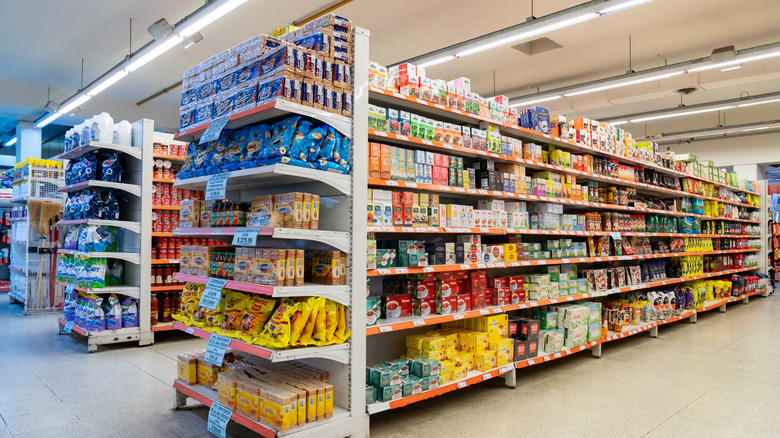The Difference Between Modern Grocery Stores And Supermarkets
Whether you like to restock your pantry items at your local bodega or you get most of your goods at a supermarket, consumers have a wide variety of storefronts to choose from when purchasing kitchen essentials. With so many options available, understanding what sets a modern grocery store apart from a supermarket can help you determine what kind of store to visit, and can even save you time and money.
While both grocery stores and supermarkets carry a wide variety of food items, supermarkets set themselves apart by also stocking a robust selection of clothing, household, and personal care items. While this might seem like a minuscule difference if you're only looking to fill your fridge, opting to go to your local supermarket can save you precious time if you have any non-food needs that your local grocery store can't provide. Supermarkets can also save you from spending money on transportation, as you won't have to waste gas or public transit funds to make multiple trips to different grocery stores.
However, smaller grocery stores can also have their own benefits compared to supermarkets. The type of store you patronize depends on your own needs, not to mention that both supermarkets and smaller stores stock different items at different price points.
Food prices vary among grocery stores
While a study published in the National Library of Medicine shows that on average, supermarkets sell staple foods at cheaper prices than most small-scale grocery stores, these smaller stores won't necessarily make your shopping trip more expensive. An extensive survey of 6,555 consumers by Market Force Information, a company specializing in retail statistics, shows that large grocery store chains like ALDI and WinCo were rated at the highest value for shoppers' money. These stores may not stock a wide array of clothing, personal care products, hardware tools, and other household fixtures, but they certainly offer bargains if you're mostly after savings on food.
Not all grocery stores are built with affordability in mind, however. There are many small-scale and chain grocers whose costs are significantly higher than supermarkets and other grocers; in particular, upscale storefronts such as Whole Foods are known to be pricey. To avoid being surprised when you head to a local grocery store, make sure to research the store you want to visit to see if their prices, quality, and stock match your needs.
Regardless of whether you choose to spend your money at the grocery store or at the supermarket, you'll want to remain wary of sales gimmicks. Seemingly great deals can easily lead you to overstock on certain food items and waste money, even at food markets with the cheapest prices.
Location also influences the price of your groceries
Inadequate access to affordable food remains one of the biggest issues for residents across the United States. For many residents in low-income and/or rural communities, purchasing affordable, quality groceries means undertaking long commutes that quickly take up time and money. In fact, small-scale stores who are not in the vicinity of supermarkets sometimes jack up the cost of their items due to a lack of competition in the area. Metropolitan centers are no stranger to this issue, either. The rising cost of living in places such as New York City has led some residents to call specialty storefronts like Trader Joe's affordable, in comparison to other options.
Individual solutions to this complex and widespread problem vary, but if time and the cost of transportation are on your side, consider scheduling your grocery runs for days where you have enough free time and can afford a longer commute. This extra time will also allow you to compare prices at different stores, giving you a better chance to make choices that won't hurt your wallet in the long run. You should also keep in mind that both grocery store and supermarket retailers like to rearrange their layouts in many ways to compel customers to browse more and spend more money. Don't rush to grab anything on display without check out the whole aisle first.



